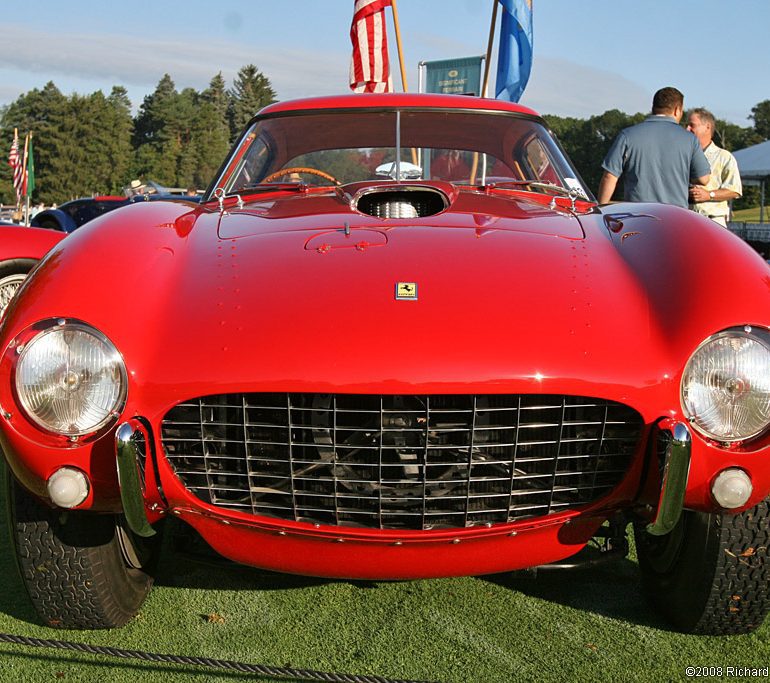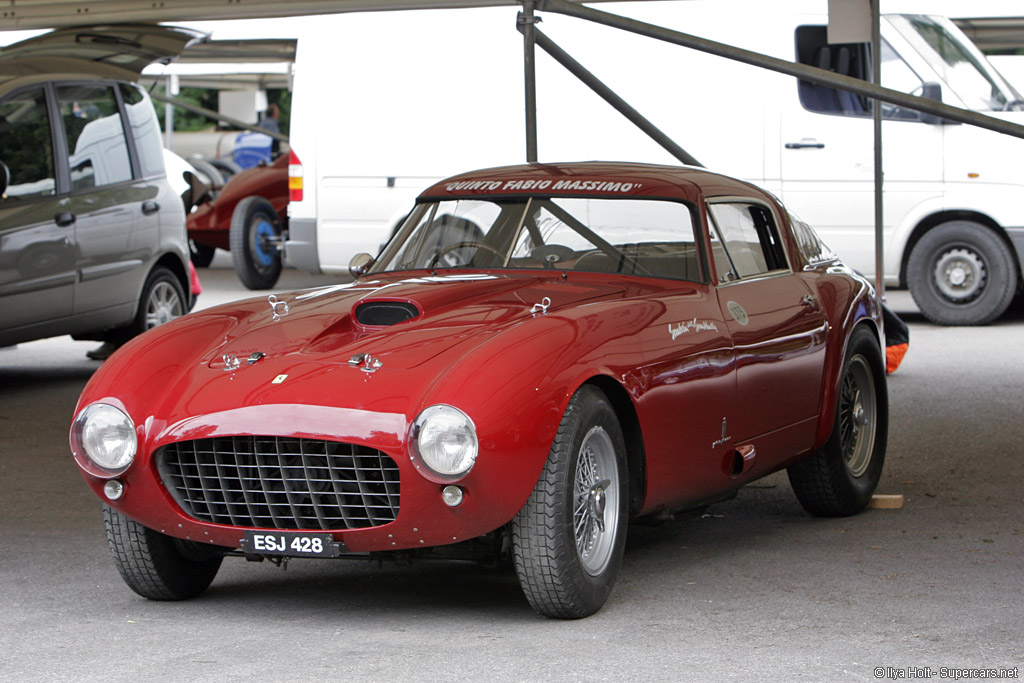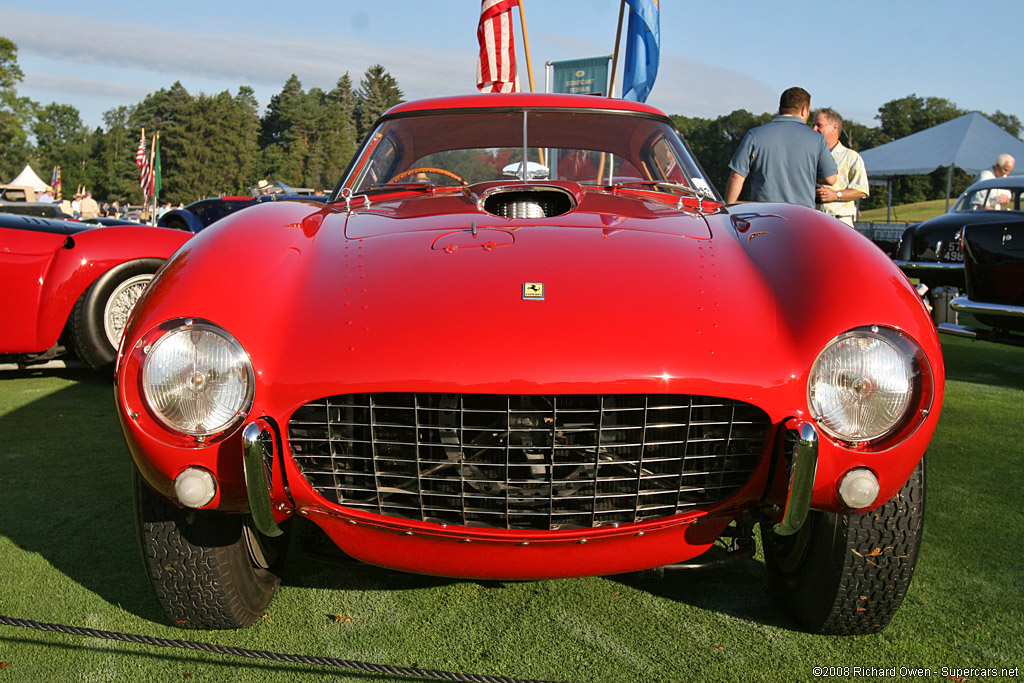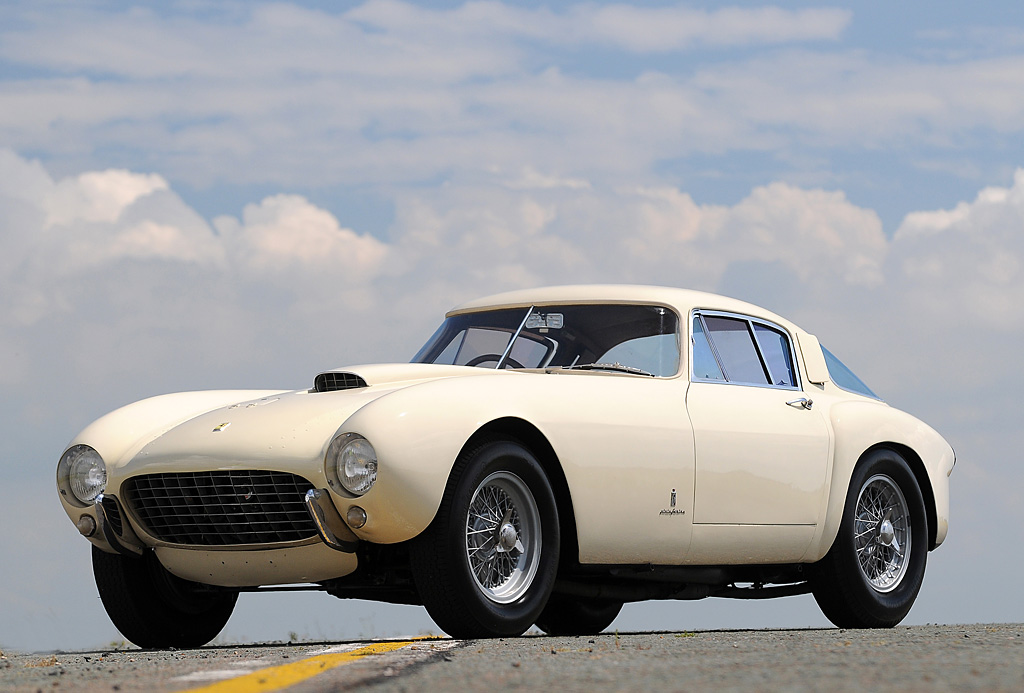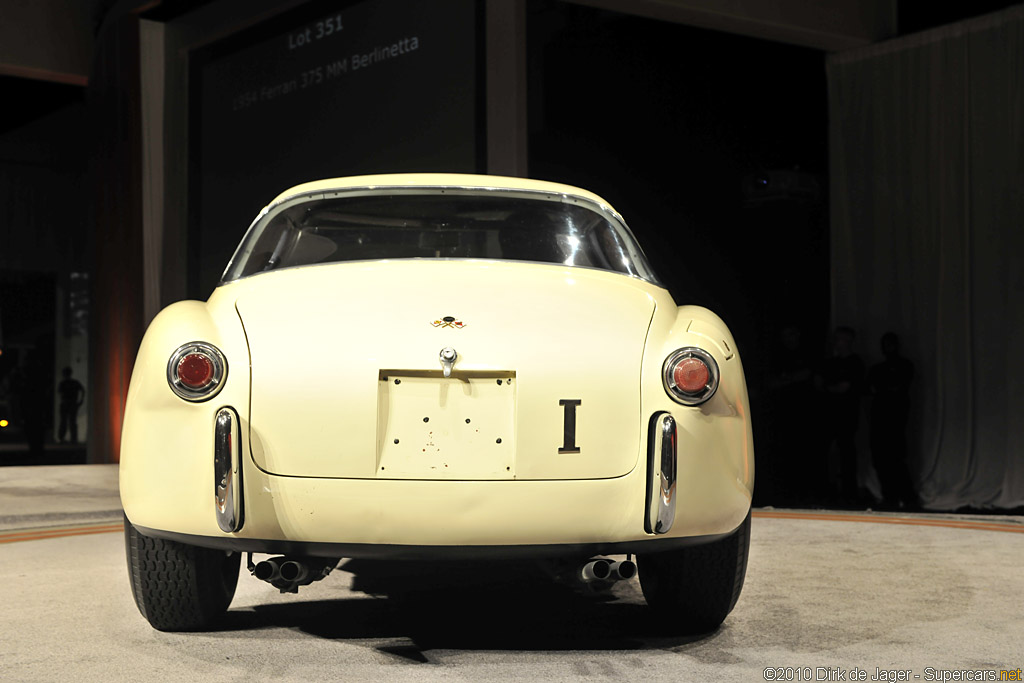1953 Ferrari 375 MM Berlinetta
Building on the success of the 340 America and its Mille Miglia victory, the 375 MM was released in 1953 as Ferrari’s most potent model. These large displacement race cars were built to contest the World Sportscar Championship and competed with the best that Lancia, Alfa Romeo, Cunningham and Jaguar had to offer. Most of the cars were built by Ferrari as racing Spyders, but six or seven Berlinettas were also made.
By 1953, Ferrari’s large V12 by Aurelio Lampredi had already won at the top level of motor sport. Some of their first F1 victories were powered by it until 1953 when the F2 regulations were adopted. However, Ferrari was able to continue with the engine in road racing cars, beginning with the 340 America and later resumed with the successful 375MM.
The 375 was named after a victory at the 1953 Mille Miglia when Giannino Marzotto and Marco Crosara piloted their Vignale Spyder to overall victory. At the time, it was Ferrari’s fifth win in a row at the event which was the most prestigious Italian road race.
At first, Ferrari fitted a detuned version of their competition-spec 375 F1 engine in the 340 America chassis to make a hybrid 340/375 MM. In late 1953 this engine was modified for customer use with a slightly shorter stroke. Called the Tipo 108, these displaced 4522cc and were slightly more responsive for twistier events such as the Targa Florio and Mille Miglia. It had all the great hallmarks of the GP engine including seven main bearings, dual-magneto ignition and four-choke Weber carburetors.
The first 375 Berlinetta, 0358AM, was delivered in September of 1953 to Scuderia Guastalla. The car was similar to the 340/375 MM that Pinin Farina built for specially for Le Mans. It raced the Carrera Panamericana twice with no success and then was sold to Carlo Bonomi in Argentina. 0380AM was the only other 375 Berlinetta that was actively raced by its owner Innocente Baggio. He took it to the Mille Miglia in 1954 and finished 19th overall and fourth in class. A month later he stranded the sandbank of Tertre Rouge during the 24 Hours of Le Mans.
In total, six or seven 375 MM coupes were made out of the complete production of 26 cars. Of these, most were built for road-use. Pinin Farina also made two Berlinetta Speciales for the 1953 and 1955 Turin Motor Shows.
1953 Ferrari 375 MM Berlinetta Gallery
See full 1953 Ferrari 375 MM Berlinetta Gallery here
In Detail
| submitted by | Richard Owen |
| type | Racing Car |
| built at | Maranello, Italy |
| body stylist | Pinin Farina |
| coachbuilder | Pinin Farina |
| engineers | Aurelio Lampredi |
| production | 7 |
| engine | Tipo 108 60º V12 |
| position | Front Longitudinal |
| aspiration | Natural |
| ignition | Twin Magneto |
| block material | Aluminum Alloy |
| valvetrain | SOHC, 2 Valves per Cyl |
| fuel feed | Weber 40 IF 4/C Carburetors |
| displacement | 4522 cc / 274.24 in³ |
| bore | 84 mm / 3.31 in |
| stroke | 64 mm / 2.5 in |
| compression | 9.0:1 |
| power | 253.5 kw / 340 bhp @ 7000 rpm |
| specific output | 75.19 bhp per litre |
| bhp/weight | 377.78 bhp per tonne |
| body / frame | Aluminum Body over Tipo 102 Steel Tube Frame |
| driven wheels | RWD |
| wheel type | Borrani RW 2989 |
| front tires | 6.00×16 |
| rear tires | 7.00×17 |
| front brakes | Hydraulic Drums |
| rear brakes | Hydraulic Drums |
| front wheels | F 40.6 x 12.7 cm / 16.0 x 5.0 in |
| rear wheels | R 40.6 x 12.7 cm / 16.0 x 5.0 in |
| steering | Worm & Wheel |
| f suspension | Double Wishbones w/Transverse Leaf Spring |
| r suspension | Live Axle w/Semi-Elliptic Leaf Springs, Twin Houdaille Shock Aborbers |
| curb weight | 900 kg / 1984 lbs |
| wheelbase | 2600 mm / 102.4 in |
| front track | 1325 mm / 52.2 in |
| rear track | 1320 mm / 52.0 in |
| length | 4175 mm / 164.4 in |
| width | 1325 mm / 52.2 in |
| height | 1320 mm / 52.0 in |
| transmission | 4-Speed Manual |
| tran clutch | Multiple Disc |
| top speed | ~280 kph / 174.0 mph |
Auction Sales History
A number of features distinguish 0416AM from others of the series, including seats that adjust both fore, aft and side to side, the lack of rear intakes for brake cooling in the door sills, front and rear bumperettes, fuel filler in rear fender with smaller engine hood and separate access port for the radiator cap.
0416AM has never raced, and this – combined with its Ferrari Classiche certification – makes it almost certainly one of the most original of all racing Ferraris. Professional restoration, outstanding condition and matching numbers. Auction Source: RM Auctions’ 2010 Sports & Classics of Monterey


